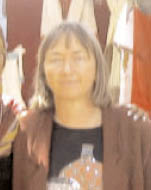
Helping refugees in Yemen [Archives:2002/15/Reportage]
April 8 2002

They have their own problems and obstacles which come with having a different language, traditions and culture.
Thats why the Partners for Development Refugee Community (PDRC) comes in. It has a role to support refugees as they adapt the new culture and the environment they live in.
On March 21-22 the refugee community center held a bazaar sponsored by Shamlan factory and an American individual sponsor. The Yemen Times spoke with Miss Heike Reidke, a program coordinator at Partners for Development about the center and filled the following interview:
YT:How many refugees are there in Yemen?
Heike: The total number of refugees in Yemen is about 60,0000 in Yemen. A large number, about 20,000 are here in Sanaa. This year we would like to expand our activities to other cities that have a big number of refugees such as Taiz and Hoddida.
Yemen is considered one of the few countries that host refugees, trying to offer many facilitations to them unlike some countries, such the one I come from, where it is difficult to put one foot down. You sent directly back on the same plane.
However, here in Yemen, for example, Somalian refugees can be accepted without a need to apply and this is something wonderful and appreciated of Yemen.
YT: Is it the first time you hold such a bazaar?
Heike: It is the third bazaar if it is not the fourth one. I am still new but what I have learned from the documents here there have been two bazaars held in the last two years .
YT: What can the bazaar offer for refugees?
Heike: Such a bazaar normally attracts refugees as it is held for them to get a chance to meet with each other and then everyone knows that he or she is not the only refugee. In addition, they can show their culture through exhibited food, clothes, handicrafts, music and dance and in same time they have a joy.
YT: Can you give us a brief idea about (PDRC)?
Heike: Partners for Development is an NGO. It was established in 1995. This NGO is an implementing partner to UNCR which is an international body to look after refugees. If they cannot provide their services directly, there others NGO to implement them with them.
YT: What do you do for refugees problems?
Heike: Whenever the refugees come directly to our office, we sit with them, interview them and listen to their problems. In fact, they have many different problems. Sometimes they have disputes at restaurants or they have problems with police on the streets or problem with each other. With a variety problems they come to us. We go to their houses where they live, or to the police if they have a problem with police or visit the police station and prisons to see if somebody is arrested there illegally, and we try to mediate with police officers.
We also offer training for the refugees which takes place here in our refugee community center.
YT: Do refugees speak Arabic? Do you organize Arabic classes for non-Arabic speakers?
Heike: Most of the refugees come with just their home language, without knowing Arabic. If they come from Sudan they are lucky because they all speak Arabic. So they dont face so many problems. So we offer language training in Arabic and English at all different levels and also French.
We have also a daycare and can accommodate 50 children for working parents. They are here from morning to afternoon until their parents come back from their work and pick them up.

There is also a small library so the students who are on language training can benefit from it.
We also offer a vocational training to refugees, not here, but in collaboration with other institutes like the Diploma Education Center, The Family Forum etc. They have different training courses and select refugees to attend training. They have hope after having completed their training, that they can get a job easier as maybe a housemaid or house cleaner.
We have computer training and technical courses by which they can work in any trading agency.
This year for first time we offer home economic courses, so refugees can produce food at home and sell it to supermarket or the general population.
YT: What kind of activities do you hold for the refugees?
Heike: Apart from these activities, last year 2001, we provided training for refugees on health issues. Most of the training has been on HIV and AIDS.
It was done in December and January.
The refugees have two days of training here in the refugee community center.
We also offer to them various testing to whoever wants to know if he has caught one of these diseases.
A big number of refugees, more than 70 % of all participants, want their blood to be tested.
This is a very big service because as you know, people are anxious and afraid to give it. It is confidential. We do not register any name. Instead we give a code.
YT: Any last word?
Heike: I hope that the people, especially Yemenis will be familiar with refugees problems and situations and can understand that it is so hard for them as a people who have already left their homeland. I hope people will try to offer what they can.
——
[archive-e:15-v:2002-y:2002-d:2002-04-08-p:./2002/iss15/report.htm]


